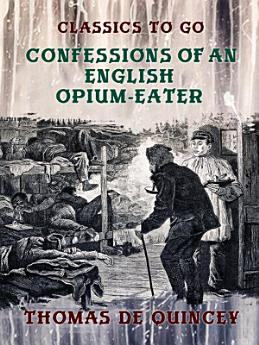Confessions of an English Opium-Eater
Mar 2019 · Otbebookpublishing
Ebook
99
Pages
family_home
Eligible
info
reportRatings and reviews aren’t verified Learn More
About this ebook
Confessions is a remarkable account of the pleasures and pains of worshipping at the 'Church of Opium'. Thomas De Quincey consumed daily large quantities of laudanum (at the time a legal painkiller), and this autobiography of addiction hauntingly describes his surreal visions and hallucinatory nocturnal wanderings through London, along with the nightmares, despair and paranoia to which he became prey. The result is a work in which the effects of drugs and the nature of dreams, memory and imagination are seamlessly interwoven, describing in intimate detail the mind-altering pleasures and pains unique to opium. Confessions of an English Opium-Eater forged a link between artistic self-expression and addiction, paving the way for later generations of literary addicts from Baudelaire to James Frey, and anticipating psychoanalysis with its insights into the subconscious. (Goodreads)
About the author
Thomas de Quincey (1785-1859) was a British essayist and literary critic whose life and work continue to captivate modern readers with their blend of intellectual rigor and personal tumult. Born in Manchester, England, de Quincey was a precocious child, mastering Greek and Latin at an early age. His academic prowess earned him a place at Oxford University, but his time there was marked by a growing dependency on opium, which would profoundly influence his life and writings.De Quincey's literary career began in earnest with his contributions to various periodicals, where his essays showcased a unique blend of erudition, wit, and a fascination with the darker aspects of the human psyche. His work often delved into themes of memory, dreams, and the subconscious, predating and arguably influencing the later explorations of these topics by Sigmund Freud.One of de Quincey's most significant contributions to literature was his pioneering use of the essay form to explore deeply personal and philosophical subjects. His style, characterized by its rich, ornate prose and introspective depth, left a lasting impact on contemporaries and later writers, including Edgar Allan Poe and Charles Baudelaire.Controversy was never far from de Quincey. His candid discussions of drug use and its effects on the mind and body were groundbreaking and scandalous for his time, challenging societal norms and opening up new avenues for literary expression. His willingness to confront taboo subjects head-on made him a revolutionary figure in the world of letters.Thomas de Quincey's legacy lies in his ability to weave personal experience with broader philosophical inquiries, creating a body of work that remains relevant and thought-provoking. His influence on the Romantic and Gothic literary movements, as well as his prescient insights into the human condition, ensure his place as a seminal figure in literary history.
Rate this ebook
Tell us what you think.
Reading information
Smartphones and tablets
Install the Google Play Books app for Android and iPad/iPhone. It syncs automatically with your account and allows you to read online or offline wherever you are.
Laptops and computers
You can listen to audiobooks purchased on Google Play using your computer's web browser.
eReaders and other devices
To read on e-ink devices like Kobo eReaders, you'll need to download a file and transfer it to your device. Follow the detailed Help Center instructions to transfer the files to supported eReaders.






